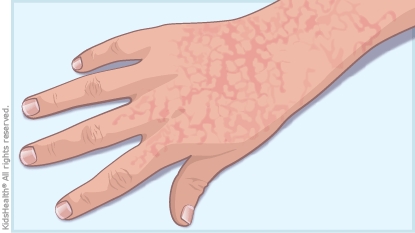Fifth Disease: How to Care for Your Child
Fifth disease is an illness caused by a virus called parvovirus B19. It's usually mild and goes away on its own.
In some children, it starts with a few days of fever, runny nose, headache, or stomach pain. Then a rash appears. The most recognizable symptom of fifth disease is a rash on the face that looks like "slapped cheeks," which might be harder to see on darker skin. After the face rash, another rash appears on the chest, back, buttocks, or arms and legs. This rash has a lacy pattern, and it may come and go over weeks or months. Sometimes kids with fifth disease have joint pain, but this is usually more of a problem in teens or adults. Some kids who are infected with parvovirus B19 never have any symptoms.


Follow the package directions for how much to give and how often. If you don't know the recommended dose or your child is younger than 2 years old, call the health care provider to find out what to use and how much to give.
-
Do not give aspirin to your child, as it has been linked to a rare but serious illness called Reye syndrome.
-
Encourage your child to drink plenty of liquids and rest as needed.

Your child's symptoms are not improving or are becoming worse.

Your child:
-
appears dehydrated; signs include dizziness, drowsiness, a dry or sticky mouth, sunken eyes, peeing less often or darker than usual pee or having fewer wet diapers, crying with little or no tears
-
has sickle cell disease or a weak immune system and shows signs of anemia (for example, is pale, very tired, dizzy, or short of breath, or has a headache)

How does fifth disease spread? Parvovirus B19, found in saliva (spit) and mucus, can spread through droplets when an infected person coughs, sneezes, or touches surfaces. It's most contagious when they have cold-like symptoms. To help prevent the spread of this and other viruses, everyone in your household should wash their hands well and often and cover their nose and mouth when coughing or sneezing. It's also a good idea to not share cups and utensils, and to keep surface areas clean.
Parvovirus B19 can spread through blood and from an infected pregnant woman to her baby. Call your health care provider if you're pregnant, because the infection can cause problems during pregnancy.
When can kids go back to school or daycare? By the time a child gets the rash, their body has already been fighting the infection for a while and they're not contagious anymore, so they can return to school or childcare.
What problems can happen with fifth disease? Parvovirus B19 can slow down or stop the body from making red blood cells, which can lead to severe anemia in:
-
people with weak immune systems (such as those with cancer or AIDS)
-
people with some types of blood disorders (such as sickle cell disease)
-
fetuses in the first half of pregnancy